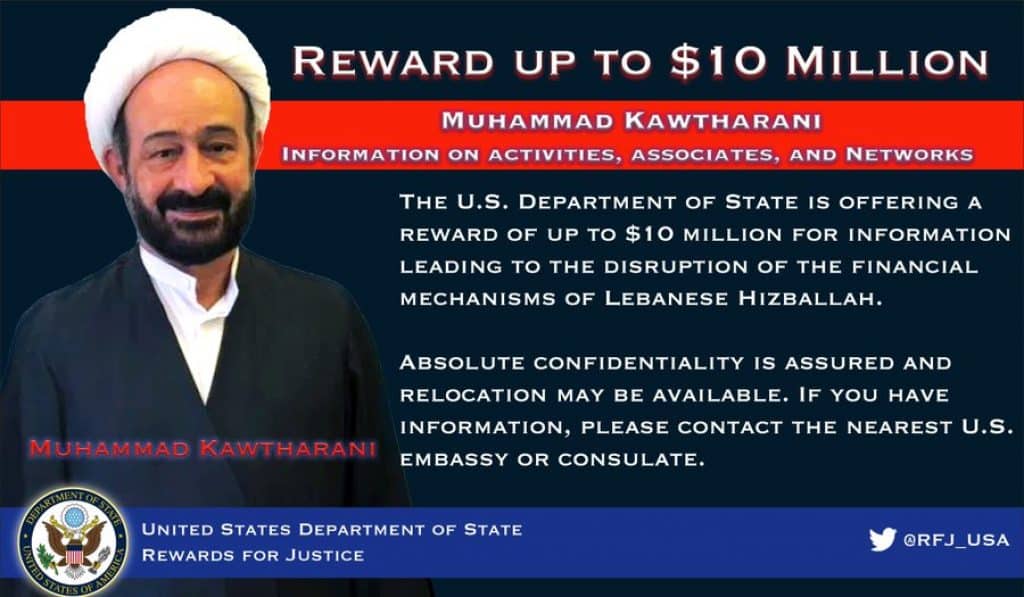
The U.S. State Department’s Rewards For Justice program has offered a $10 million bounty for information on Muhammad Kawtharani, one of Hezbollah’s senior operations commanders inside Iraq. Hezbollah operates in Iraq closely alongside Iran’s Islamic Revolutionary Guards Corps to prop up and support Shia militias hostile to the U.S. and the West.
In its reward announcement, State asked for “information leading to the disruption of the financial mechanisms” of Hezbollah.
The $10 million reward for Kawtharani places him in the second tier of State’s most wanted terrorists. He is on par with the likes of al Qaeda’s Saif al Adel and Yasin al Suri, Lashkar-e-Taiba’s Hafiz Saed, the the Taliban’s deputy emir, Sirajuddin Haqqani.
Only Ayman al Zawahiri, al Qaeda’s emir, commands a larger bounty of $25 million.
State noted that Kawtharani “is a senior leader of Hezbollah’s forces in Iraq and has taken over some of the political coordination of Iran-aligned paramilitary groups formerly organized” by Qaasem Soleimani, the last commander of the Islamic Revolutionary Guards Corps – Qods Force.
The U.S. killed Soleimani, Abu Mahdi al Muhandis, the deputy commander of the Iranian-backed Popular Mobilization Forces, and a number of Qods Force and militia members in an airstrike in Baghdad on Jan. 2. The strike was carried out after the militias attacked U.S. bases and the embassy in Baghdad.
Kawtharani “facilitates the actions of groups operating outside the control of the Government of Iraq that have violently suppressed protests, attacked foreign diplomatic missions, and engaged in wide-spread organized criminal activity,” according to State.
He is a “member of Hezbollah’s Political Council” and “has worked to promote Hezbollah’s interests in Iraq, including Hezbollah efforts to provide training, funding, political, and logistical support to Iraqi Shi’a insurgent groups.”
The U.S. Treasury previously identified Kawtharani as “the individual in charge of Hezbollah’s Iraq activities” in his terrorism designation in 2013. At the time, Treasury noted that he helped facilitate the movement of “fighters to Syria to support the Assad regime.”
Hezbollah has a long history of involvement in supporting Iran’s efforts to destabilize Iraq and back the multitude of Shia terror groups backed by the Iranian regime. Treasury also noted in 2013 that Kawtharani was involved in securing the release of Ali Musa Daqduq, a key Hezbollah leader who was tasked by Soleimani with establishing and training the Shia militias at the beginning of the Iraq war. Daqduq commanded both a Hezbollah special operations unit and the security detail of Hezbollah leader Hassan Nasrallah. [See LWJ report, Iraq frees Hezbollah commander who helped mold Shia terror groups.]
The Kawtharanis, brothers in Hezbollah
Kawtharani’s brother, Hussein, is also listed by the U.S. government as a global terrorist. In 2018, Treasury added Hussein and three other Hezbollah leaders to its list of specially designated global terrorists.
Hussein was designated for facilitating business and financial dealing for Hezbollah in Iraq. Additionally, he “has served as the right hand man for his brother and senior Hezbollah member Muhammad Kawtharani,” according to Treasury.
As the U.S. military winds down its operations in Iraq and is working to consolidate its forces into two bases, the Iranian-backed militias continue to test American resolve. The militias have incessantly targeted American bases with mortar and rocket attacks, including one in early March that killed two U.S. soldiers and one British soldier.
Iran and its premier proxy, Hezbollah, will continue to fill the void that is being left by the U.S. drawdown.







